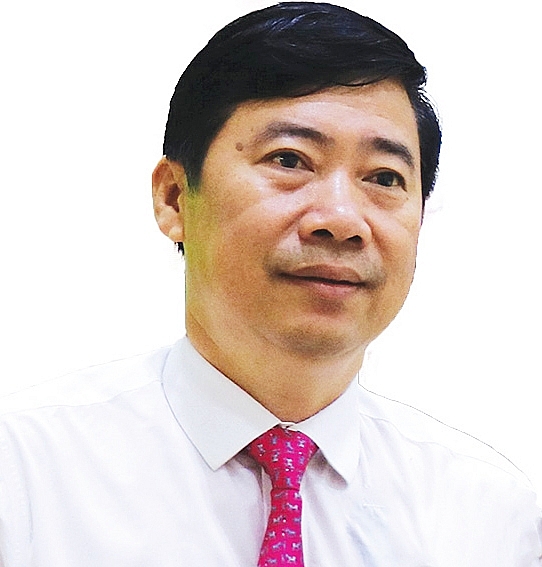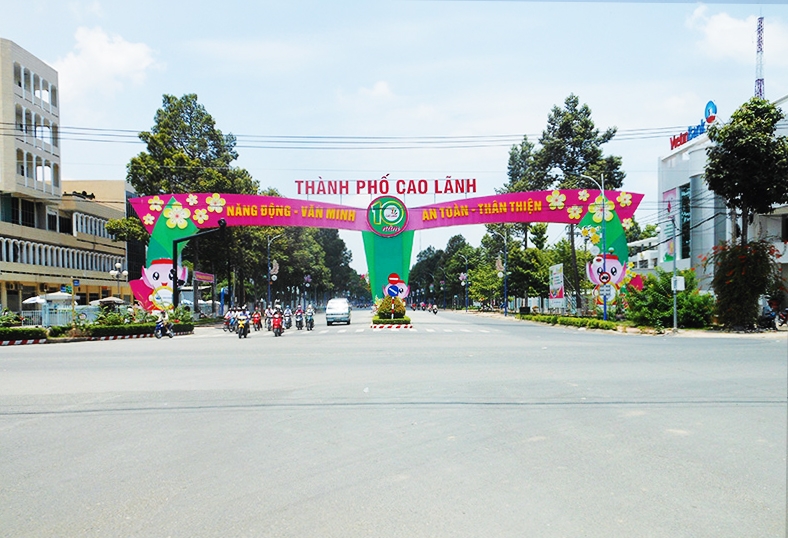Dong Thap grasps momentum in socioeconomic development
What have been the main achievements in Dong Thap’s socioeconomic development during what has been a tough year?
 |
| Pham Thien Nghia, Chairman of Dong Thap People’s Committee |
The pandemic remains complicated around the world, with a great impact on all walks of life. Despite this, Dong Thap People’s Committee has strived to achieve the goals and solutions of the government, the action programme of Dong Thap Party Committee, and a resolution of the provincial People’s Council on socioeconomic development for 2020.
Dong Thap is failing to reach the growth target but it still ranks third in the Mekong Delta and 34th out of 63 cities and provinces nationwide. Its economic scale continues to expand to reach over VND87 trillion ($3.76 billion) by 2020, an increase of 1.53 times compared to 2015.
Specifically, the province continues to implement agricultural sector restructuring to promote cooperation and improve markets. The plan is also aimed to reduce costs, increase quality, and develop refined processing. The plan is expected to create a major change in the awareness of farmers, businesses, and local authorities, shifting from the thinking of agricultural production to thinking of agricultural economy.
The agriculture sector has been gradually transforming towards a commodity-based production model in which modern technology processes are applied into production to increase added value for the products. It is also linked with major distribution systems nationwide to improve agricultural product consumption, helping the agro-forestry-fishery sector maintain growth moderately (up 2.12 per cent).
It is estimated that the production value of this sector will reach VND43.94 trillion ($1.89 billion), an increase of 4.41 per cent compared to 2019, equivalent to VND1.85 trillion ($79.89 million).
Businesses still maintain production and business activities in this challenging time thanks to the local source of raw items like rice and pangasius. The seafood and animal feed processing industry posted slight growth, maintained its position in the market, and made a great contribution to the overall growth of the industry at 6.75 per cent.
In addition, almost all industrial products increased slightly over the same period. The value of industrial production was estimated at VND66.96 billion ($2.89 million compared with prices in 2010), up 8.17 per cent over last year’s period.
Dong Thap has implemented many trade promotion programmes to connect supply and demand with major cities and provinces. The province has teamed up with Tiki to organise Dong Thap specialty week on the e-commerce platform. The province also formed Dong Thap specialty introduction and distribution centres in Hanoi and Ho Chi Minh City.
Meanwhile, it continues efforts to cement relationships with modern distributors so that businesses can promote and stimulate their product consumption while reducing time and shipping expenses. As a result, the total sales value of goods and services are estimated to reach VND101.6 trillion ($4.28 billion), an increase of 6.7 per cent compared to 2019.
Import and export activities have encountered many difficulties since Vietnam’s key export markets, especially China, the United States, and the European Union, became pandemic centres. However, the export turnover of goods is estimated at $1.18 billion (excluding temporarily imported and re-exported petrol and oil), equivalent to last year’s figure.
 |
| The province is effectively using public investment capital to improve connectivity |
What are the barriers for the province to attract investors and support business development?
As of September 30, the province has had 451 newly-established companies, up 59 compared to 2019. However, the registered capital is declining. The global health crisis has had a great impact, thus newly-established enterprises with a small scale have yet to make bold moves to invest in the province.
The effective connection with major investors is a bright spot in the province’s investment promotion this year. Specifically, TH Group is looking for an investment partnership in the agricultural sector.
T&T Group also signed an MoU of strategic cooperation in the fields of real estate investment, finance, energy, agriculture, tourism, trade, services, and logistics.
After conducting a survey, Novaland Group has also invested in Blue Dragon’s smart urban area and Bui Thanh Thuy tourist village in Hong Ngu district.
Furthermore, Dong Thap People’s Committee has granted investment registration certificates for 15 projects, with a total capital of over VND840 billion ($36.25 million). Among them, there were two foreign-invested projects with a capital of VND415 billion ($17.91 million).
This marks an important achievement in the province’s efforts to build a business-friendly government, which always accompanies businesses and drives dynamic and stable socioeconomic development.
Although there are still many difficulties, the business community is still optimistic about economic recovery in the coming time. Dong Thap identifies businesses as the key focus for driving economic development. Therefore, business development is one of the five breakthroughs in the province’s development strategy for the 2020-2025 period. The province pays attention and encourages the formation of new entrepreneurs as well as micro- and small-sized businesses to create a platform for major development.
One of the major obstacles for Mekong Delta localities is that infrastructure has yet to meet requirements and lack investment resources. What are the solutions to mobilise investment capital?
Given the limited local resources, Dong Thap has placed priority on attracting investment capital from social funds, enterprises, and international cooperation projects.
In 2021, the province needs investment capital of VND23.5 trillion ($1.02 billion) for development, accounting for 25.3 per cent of regional GDP. Among them, the expected public investment is about VND5.18 trillion ($225 million).
Dong Thap will continue to implement policies to encourage investment from social funds especially in the fields of healthcare, education, vocational training, culture, sports, and the environment. This is one of the province’s solutions to mobilise social resources to boost development.
In addition, the province also improves the efficiency of using public investment capital to develop main traffic axes. This will help the province to improve connectivity while its districts can complete the rural transport system in line with the new rural standards.
Dong Thap will also make investment in agricultural and rural infrastructure as well as tourism infrastructure. It will launch programmes to enhance links with Long An and Tien Giang provinces under a scheme on connectivity for Dong Thap sub-regional sustainable development.
What socioeconomic development goals will Dong Thap focus on next year to drive the growth momentum until 2025?
Given the forecasts of opportunities and challenges in 2021, Dong Thap is setting the target of implementing a resolution of the 11th Provincial Party Congress on socioeconomic development and fulfilling key tasks with the highest results.
In particular, Dong Thap continues its focus on reviving production, business, and economic growth after natural disasters and the pandemic. The efforts will go hand-in-hand with restructuring the economy and improving growth quality. The province continues to improve the fair and favourable investment environment too, facilitating both businesses and startups. It also encourages all economic sectors to make investment towards sustainable development.
Other tasks are to generate employment, improving people’s income, ensure social security, and protect the environment as well as improve cultural and spiritual life for the people. The province is making efforts to maintain national defence, security, politics, social order, and safety, especially in the national border areas.
In 2021, Dong Thap strives for an economic growth rate of 7 per cent, of which the tier-1 area would grow 3.7 per cent, tier-2 up around 9.2 per cent, and tier-3 area up 8.5 per cent.
What the stars mean:
★ Poor ★ ★ Promising ★★★ Good ★★★★ Very good ★★★★★ Exceptional
Related Contents
Latest News
More News
- Hermes joins Long Thanh cargo terminal development (February 04, 2026 | 15:59)
- SCG enhances production and distribution in Vietnam (February 04, 2026 | 08:00)
- UNIVACCO strengthens Asia expansion with Vietnam facility (February 03, 2026 | 08:00)
- Cai Mep Ha Port project wins approval with $1.95bn investment (February 02, 2026 | 16:17)
- Repositioning Vietnam in Asia’s manufacturing race (February 02, 2026 | 16:00)
- Manufacturing growth remains solid in early 2026 (February 02, 2026 | 15:28)
- Navigating venture capital trends across the continent (February 02, 2026 | 14:00)
- Motivations to achieve high growth (February 02, 2026 | 11:00)
- Capacity and regulations among British areas of expertise in IFCs (February 02, 2026 | 09:09)
- Transition underway in German investment across Vietnam (February 02, 2026 | 08:00)

 Tag:
Tag:




















 Mobile Version
Mobile Version